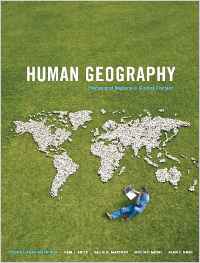Description
Test Bank Human Geography Places And Regions in Global Context 4th Canadian Edition by Paul L. Knox
Human Geography, Cdn. 4e (Knox, et al.)
Chapter 1 Geography Matters
1) Human geography can best be defined as:
A) the study of the spatial organization of human activity and relationships with their environment
B) the mapping of distinct human settlements and cultural landscapes
C) the study of human groups and the spatial diffusion of their cultures
D) the study of the spatial relationships between human and social structures
E) the study of the spatial forms of environmental development
Answer: A
Diff: 2 Type: MC Page Ref: 5
Topic: Why places matter
Skill: Applied
2) These refer to large-scale geographic divisions based on continental and physiographic settings that contain major groupings of peoples with broadly similar cultural attributes.
A) subnational regions
B) states
C) world regions
D) world systems
E) supranational regions
Answer: C
Diff: 2 Type: MC Page Ref: 11
Topic: Why places matter
Skill: Recall
3) This scale is of interest to geographers because it represents the operational scale for cognition, perception, imagination, free will, and behaviour.
A) community
B) home
C) self
D) city
E) family
Answer: C
Diff: 2 Type: MC Page Ref: 12
Topic: Why places matter
Skill: Recall
4) This ancient Chinese practice-paid close attention to the location of sites in the landscape.
A) zen
B) feng shui
C) Confucianism
D) Taoism
E) Shinto
Answer: B
Diff: 2 Type: MC Page Ref: 17
Topic: Why places matter
Skill: Recall
5) According to a 2005 Royal Canadian Geographic survey, what percent of Canadians are considered geographically illiterate?
A) 33 percent
B) 10 percent
C) 50 percent
D) 25 percent
E) 40 percent
Answer: A
Diff: 2 Type: MC Page Ref: 5
Topic: Why geography matters
Skill: Recall
6) The first people to develop geographic knowledge significantly were the
A) Chinese.
B) Romans.
C) Mayans.
D) Phoenicians.
E) Greeks.
Answer: E
Diff: 1 Type: MC Page Ref: 14
Topic: Why places matter
Skill: Applied
7) As sites of innovation and change, places are often conflated with the movements they inspire. For instance, the ‘hippie’ lifestyle of the 1960s is most associated with this U.S. city:
A) Las Vegas
B) Seattle
C) Los Angeles
D) New York
E) San Francisco
Answer: E
Diff: 1 Type: MC Page Ref: 9
Topic: Why places matter
Skill: Recall
8) In the centuries after the fall of the Roman Empire, geographic knowledge was advanced primarily by
A) Greek scholars.
B) Middle Eastern and Chinese scholars.
C) Scandinavian scholars.
D) Charlemagne’s scholars.
E) Early Christians.
Answer: B
Diff: 1 Type: MC Page Ref: 14
Topic: Why places matter
Skill: Applied
9) Supranational organizations often challenge this aspect of states.
A) sovereignty
B) militarization
C) bureaucracy
D) imperialism
E) nationalism
Answer: A
Diff: 2 Type: MC Page Ref: 12
Topic: Why places matter
Skill: Applied
10) The European Union, North American Free Trade Association, and the Association of South East Asian Nations are examples of
A) global networks.
B) intra-state organizations.
C) inter-state organizations.
D) supranational organizations.
E) subnational organizations.
Answer: D
Diff: 2 Type: MC Page Ref: 12
Topic: Why places matter
Skill: Recall



Be the first to review “Test Bank Human Geography Places And Regions in Global Context 4th Canadian Edition by Paul L. Knox”